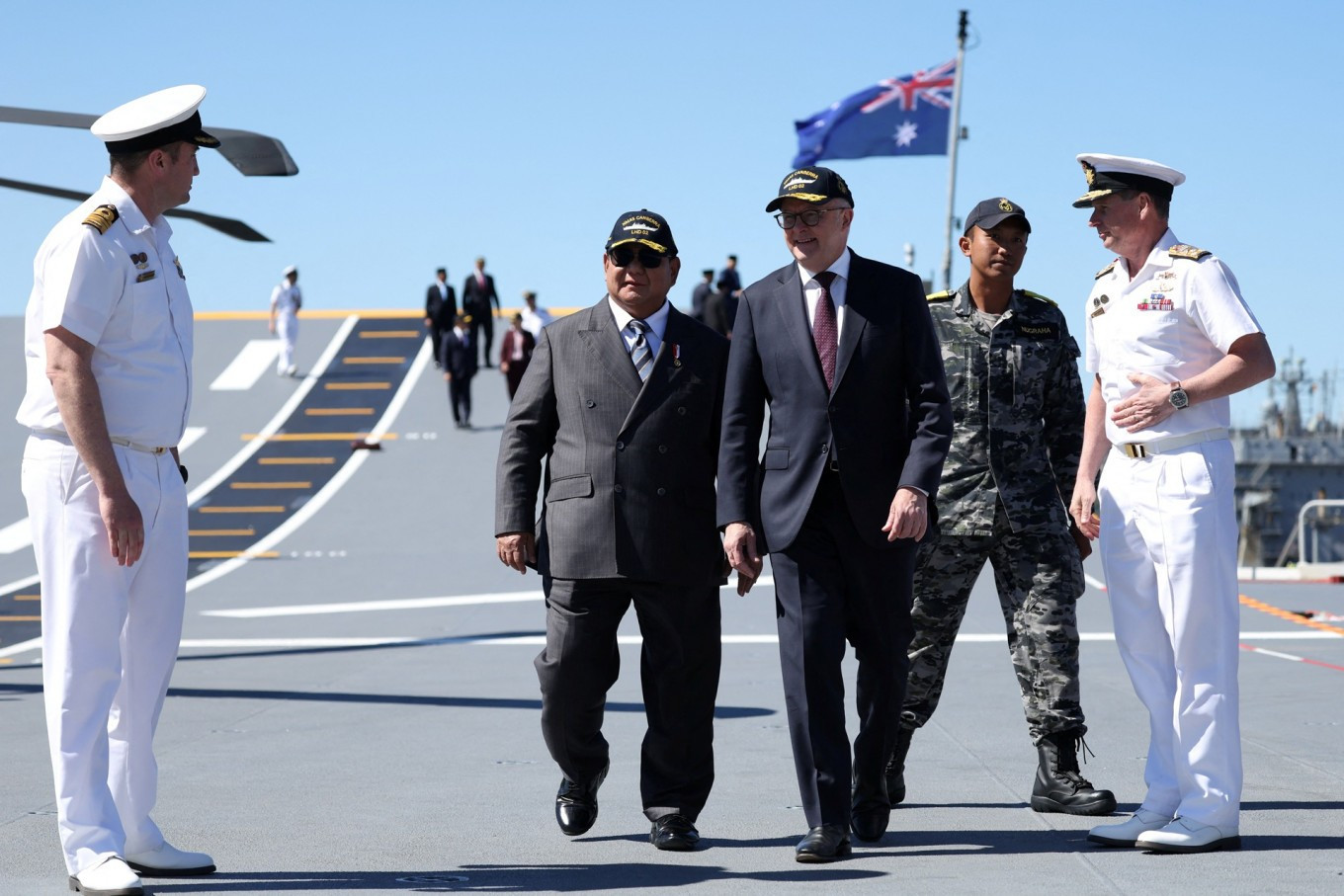News
Jakarta, Canberra move forward on stronger security treaty
Tenggara Strategics November 28, 2025 President Prabowo Subianto (second left) and Australian Prime Minister Anthony Albanese (center) walk on the deck of Fleet Flagship HMAS Canberra on Nov. 12, 2025, during a visit to HMAS Kuttabul, the Royal Australian Navy’s Fleet Base East in Sydney. (Reuters/Hollie Adams)
President Prabowo Subianto (second left) and Australian Prime Minister Anthony Albanese (center) walk on the deck of Fleet Flagship HMAS Canberra on Nov. 12, 2025, during a visit to HMAS Kuttabul, the Royal Australian Navy’s Fleet Base East in Sydney. (Reuters/Hollie Adams)
Indonesia and Australia are moving toward clinching a new, stronger defense treaty that could potentially affect the Indo-Pacific security landscape, particularly in the South China Sea, where tension has been building in recent years due to overlapping territorial claims between China and several Southeast Asian countries.
Security dominated the discussion between Australian Prime Minister Antony Albanese and President Prabowo Subianto during his first state visit to the southern neighbor. In their joint press conference aboard the Royal Australian Navy's flagship HMAS Canberra on Nov. 12 in Sydney, the two leaders announced that, following what Albanese described as substantive negotiations, they were ready to sign an enhanced bilateral security treaty between their countries.
The signing of the treaty, which builds on the 2006 Lombok Treaty and the defense cooperation agreement Prabowo signed in 2024 when he was defense minister, is scheduled for Albanese's upcoming visit to Jakarta in January 2026.
Details of the treaty have not been released, but Albanese said it would entail regular consultations at the head of state and ministerial levels, including when the security of either country was under threat. He also mentioned exploring joint and individual measures to deal with such threats.
This marks a new achievement for Prabowo, a retired Army general with a strong grasp of geopolitical and security challenges who has taken a keen interest in foreign policy since he took office in October 2024, making a flurry of overseas tours immediately afterward to cut deals. With Australia, the focus was on security.
The revamped Indonesia-Australia defense treaty could bridge the gap between the different ways each approaches the security situation in the Indo-Pacific.
Australia has formed various alliances, including a bilateral one with the United States (US), the trilateral group known as AUKUS with the US and the United Kingdom, and the Quadrilateral Security Dialogue (Quad) with the US, Japan, and India. Their common objective is to counter the emergence of China as a global superpower.
Indonesia, under its foreign policy principle of non-alignment, relies primarily on diplomacy and maintains national security via defense cooperation agreements with just about every notable country, including China, its biggest trading partner. But it has far more defense and security cooperation, and conducts more joint military exercises, with the US and Australia.
There is a good reason for that. Indonesia's sole external security threat is likely to come from China due to ongoing tensions in the Natuna Sea, the southern part of the South China Sea in Riau Islands Province which China claims as a traditional fishing ground. The area has seen skirmishes between Indonesian Navy patrols and Chinese Coast Guard vessels escorting Chinese fishing boats, although not to the same extent as confrontations between China and the Philippines.
Although neither the joint press statement nor any documents that emerged from Prabowo and Albanese's meeting in Sydney mentions China, it is obvious that both had China in mind when discussing regional security. The goal for Australia, as well as the US, is to protect the South China Sea as a critical maritime trade route.
Indonesia and Australia have intensive bilateral security arrangements, and the two countries also participate in many multinational military drills in the region. They also conduct the "2+2" defense and foreign ministers’ meetings and an annual leadership meeting, which Albanese hosted in May 2025.
Their relationship is not without its ups and downs, often over security matters.
In 1999, president B.J. Habibie tore up the 1995 defense treaty with Australia over disputes related to Indonesian-occupied Timor Leste. In 2013, Indonesia learned that Australian intelligence had been tapping the telephone calls of Indonesian leaders, including Susilo Bambang Yudhoyono (2004-2009; 2009-2014).
President Prabowo jokingly alluded to this espionage scandal during the Sydney press conference, saying to Albanese: "I think your intelligence is very good. You know that I like bagpipes, so I am received by bagpipes."
What we've heard
A source close to the government has revealed that Australia increasingly views Indonesia as an indispensable partner for maintaining regional stability, particularly in the face of shifting geopolitical dynamics. As concerns grow about China's expanding influence in the Indo-Pacific, Canberra regards Jakarta as a critical ally capable of securing the region's southern flank.

